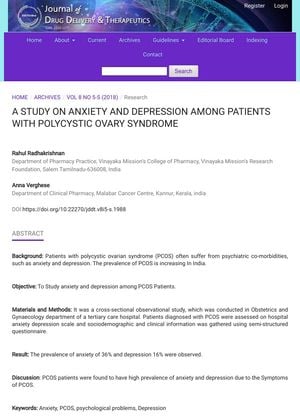TLDR People with polycystic ovary syndrome often experience anxiety and depression.
In a cross-sectional observational study conducted 5 years ago, patients diagnosed with polycystic ovarian syndrome (PCOS) were assessed for anxiety and depression. The study, conducted in the Obstetrics and Gynaecology department of a tertiary care hospital, found a prevalence of anxiety in 36% of the patients and depression in 16% of the patients. The high prevalence of these psychiatric co-morbidities was attributed to the symptoms of PCOS.
 1514 citations
,
December 2011 in “Fertility and sterility”
1514 citations
,
December 2011 in “Fertility and sterility” Experts agree that PCOS affects women's health in complex ways, but more research is needed to understand and treat it effectively.
317 citations
,
April 2018 in “Journal of steroid biochemistry and molecular biology/The Journal of steroid biochemistry and molecular biology” PCOS is a complex condition in women that can lead to health issues, and lifestyle changes are the best management approach.
112 citations
,
July 2020 in “BMC Medicine” Women with PCOS may be at higher risk for severe COVID-19.
62 citations
,
October 2019 in “Liver International” Women with PCOS have more severe liver disease.
 58 citations
,
January 2013 in “The Journal of Clinical Endocrinology and Metabolism”
58 citations
,
January 2013 in “The Journal of Clinical Endocrinology and Metabolism” Obese women with PCOS show a male-like pattern in certain fat tissue gene expressions.
 48 citations
,
February 2008 in “Nutrition in Clinical Practice”
48 citations
,
February 2008 in “Nutrition in Clinical Practice” Dietary changes, including weight loss and a balanced diet, are important for managing PCOS, especially in overweight women.



